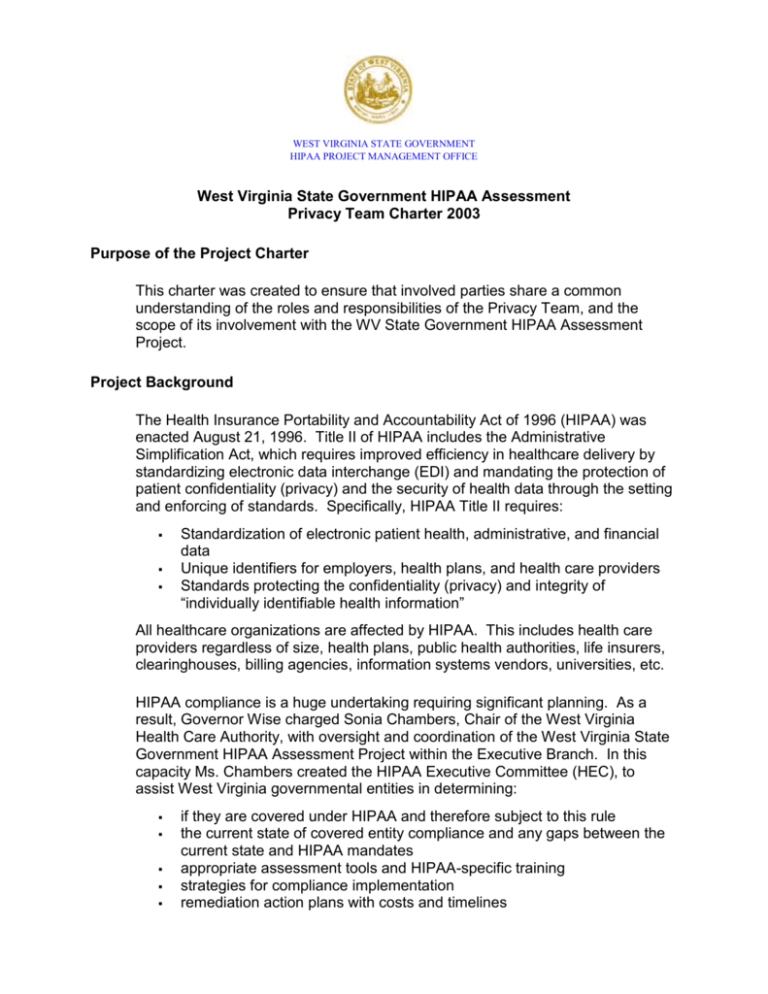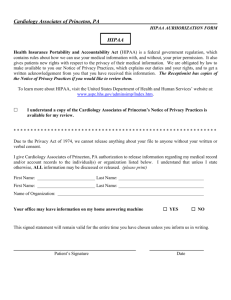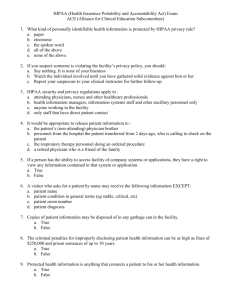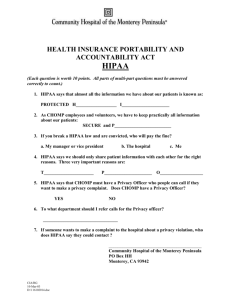Privacy Team Charter - West Virginia Department of Health and
advertisement

WEST VIRGINIA STATE GOVERNMENT HIPAA PROJECT MANAGEMENT OFFICE West Virginia State Government HIPAA Assessment Privacy Team Charter 2003 Purpose of the Project Charter This charter was created to ensure that involved parties share a common understanding of the roles and responsibilities of the Privacy Team, and the scope of its involvement with the WV State Government HIPAA Assessment Project. Project Background The Health Insurance Portability and Accountability Act of 1996 (HIPAA) was enacted August 21, 1996. Title II of HIPAA includes the Administrative Simplification Act, which requires improved efficiency in healthcare delivery by standardizing electronic data interchange (EDI) and mandating the protection of patient confidentiality (privacy) and the security of health data through the setting and enforcing of standards. Specifically, HIPAA Title II requires: Standardization of electronic patient health, administrative, and financial data Unique identifiers for employers, health plans, and health care providers Standards protecting the confidentiality (privacy) and integrity of “individually identifiable health information” All healthcare organizations are affected by HIPAA. This includes health care providers regardless of size, health plans, public health authorities, life insurers, clearinghouses, billing agencies, information systems vendors, universities, etc. HIPAA compliance is a huge undertaking requiring significant planning. As a result, Governor Wise charged Sonia Chambers, Chair of the West Virginia Health Care Authority, with oversight and coordination of the West Virginia State Government HIPAA Assessment Project within the Executive Branch. In this capacity Ms. Chambers created the HIPAA Executive Committee (HEC), to assist West Virginia governmental entities in determining: if they are covered under HIPAA and therefore subject to this rule the current state of covered entity compliance and any gaps between the current state and HIPAA mandates appropriate assessment tools and HIPAA-specific training strategies for compliance implementation remediation action plans with costs and timelines A significant force in achieving these objectives and ultimately HIPAA compliance resides with the Privacy Team. Sallie Hunt of the WV Health Care Authority was therefore asked to lead the Privacy Team addressing HIPAA privacy’s requirements. Problem Statement Both Assessment and Compliance Implementation phases of this project are federally mandated under the Health Insurance Portability and Accountability Act of 1996 (HIPAA). Consequently, West Virginia state government business systems, processes, and policies, may not be compliant, and performing a thorough assessment with limited resources will be a challenge. In addition to anticipated non-compliance and resource allocation issues, timelines for achieving compliance are tight: extension plans for Transactions and Code Sets were filed in October 2002; Privacy regulations must be implemented by April 2003; TCS must be fully implemented by October 2003; and Security mandates are also anticipated to be enforceable within that timeframe. Goals and Objectives The State of West Virginia is undertaking a HIPAA Assessment to evaluate the impacts of the Health Insurance Portability and Accountability Act (HIPAA) on covered executive branch agencies. The goal of this project is to produce an Assessment Findings and Remediation Recommendations final report that includes a strategic plan with recommendations, timelines, and cost estimates for the executive branch’s implementation of HIPAA. Specifically, the HIPAA Assessment will determine the systems, procedures, policies, and business associate/trading partner agreement changes, etc. that must be made to comply with HIPAA mandates. In support of the project’s goals, the Privacy Team’s mission is to assist the HIPAA Executive Committee (HEC) in efforts to assure HIPAA compliance, in the area of privacy. The Privacy Team will review the gaps resulting from the Privacy Impact Determination Tool (IDb) and make enterprise-wide recommendations. The Team will support and provide information to Covered Entities regarding writing/revising policy, to assist them in becoming HIPAA compliant with the Privacy regulations. The Team will develop a process for Covered Entities to execute Business Associate Agreements as necessary, and will develop a process for future compliance. The Privacy Team will develop a process for Covered Entities to incorporate state laws not preempted by HIPAA, and other federal health-related laws, into agency policy and Business Associate Agreements as necessary. The Team will provide a training strategy for the Covered Entities to employ. 2 Sub-committees were formed to address the Privacy Team’s objectives: Full Team (Lead – Sallie Hunt) Full team will review gaps identified by the Privacy assessment tool, identify enterprise-wide solutions and make recommendations. Policy (Co-leaders -Sallie Hunt and Claire Winterholler) Determine policy templates to be used. Covered Entities will identify existing policies and track their protected health information. Covered Entities will incorporate template policies, notices, forms, etc. into policy and/or draft new policy. Training and policy development modules will be developed for each area of Privacy. Module training to be provided to entire Policy team from all Covered Entities. Policy completion, implementation, training and assurance of proper maintenance and retention are verified by Covered Entity Privacy Officer sign-off. Business Associate (Lead – Charlene Vaughan) Develop a Master Business Associate Agreement, with sign-off required by the Department of Administration, the Governor’s Office of Technology, and the Attorney General. DOA and GOT to sit on team. Develop a process for Covered Entities to identify all contracts requiring a Business Associate Agreement; modify those lacking appropriate HIPAA language; assist in the renegotiation of those contracts; and develop processes for future determination of those requiring Business Associate Agreements and on-going contract negotiations. These processes require buy-in and support from the Department of Administration, the Governor’s Office of Technology, and the Attorney General. Preemption and other Federal Laws (Lead - Steve Small) Develop a process and a work plan for covered entities to incorporate the results from the state preemption analysis, and the analysis of other federal health-related laws, into agency policy and Business Associate Agreements as necessary. Serve as a resource to the Policy and BA subcommittees regarding the preemption analysis and the other federal laws identified as health-related. Training (Lead – Tracy Christofero) Train-the-trainer to agency training staff for rollout of new policies throughout their organization, concurrent with policy development. Membership The Privacy Team is comprised of knowledgeable cross-agency legal, policy, IT and training staff interested in actively participating to ensure privacy related HIPAA compliance within the Executive Branch of West Virginia State Government. 3 The following individuals hold leadership positions within the Privacy Team and serve on the Privacy Management Team: Sallie Hunt – HIPAA Senior Legal Counsel, Privacy Team Lead, Policy Subcommittee Co-Lead Claire Winterholler – Policy Subcommittee Co-Lead Charlene Vaughan – Business Associate Subcommittee Lead Steve Small – Preemption and other Federal Laws Subcommittee Lead Outreach and Education Lead/Privacy Training Lead – Tracy Christofero John Bianconi – DHHR representative Tracy Christofero – HIPAA Project Manager Each covered entity’s HIPAA Coordinator shall designate individuals to serve on each of the subcommittees. Deliverables Recommendations to HEC regarding solutions to the Privacy gaps for the Current State and Gap Analysis Report. (Responsible: Sallie) Report on CE Privacy compliance, showing: o HIPAA policies, procedures, forms, notices, etc. have been implemented (Responsible: Sallie and Claire) o BA Agreements have been executed as necessary by April 14, 2003, including a copy of the master BA Agreement template (Responsible: Charlene) o Written process for negotiating and executing remaining BA Agreements by April 14, 2004; future modifications to master BA Agreement template, and development and implementation of process to ensure that all future contracts requiring a BA Agreement have one (Responsible: Charlene). o The process developed so that the preemption analysis and other federal health-related laws were incorporated by the Covered Entities into the HIPAA policies, procedures, forms, notices, etc. and BA Agreements. (Responsible: Steve) o Privacy training, such that all required employees have been trained on the HIPAA privacy policies and procedures. Documented process for training new employees and on-going training. (Responsible: Tracy and Lethie). 4 o The development of the privacy infrastructure. (Responsible: Sallie) Report on written processes for privacy audits, continuing compliance, enforcement and policy review and amendment (Responsible: Sallie and Claire) Report on execution of remaining BA agreements by 4/14/04 (Responsible: Charlene; report not due until 3/14/04). Process To facilitate communication, each subcommittee lead will have a dedicated portion of the State’s HIPAA website to post material. Communication will also be facilitated through the HIPAA Coordinators of each Covered Entity. Upon completion of a deliverable, the subcommittee lead will present the deliverable to the Privacy Team Lead, along with the Deliverable Acceptance Form. The deliverable will either be accepted or returned with issues noted for resolution. A copy of the form is attached. Each member of the Privacy Management Team shall e-mail the other members of the team regarding issues, achievement of major milestones and a first of the month status report. Each subcommittee lead is responsible for meeting their deliverables by all deadlines established. Each lead shall develop and maintain their own work plan and will share copies with the Privacy Management Team. Each lead shall update the PMO at the first of each month as to changes in their portion of the work plan. 5






